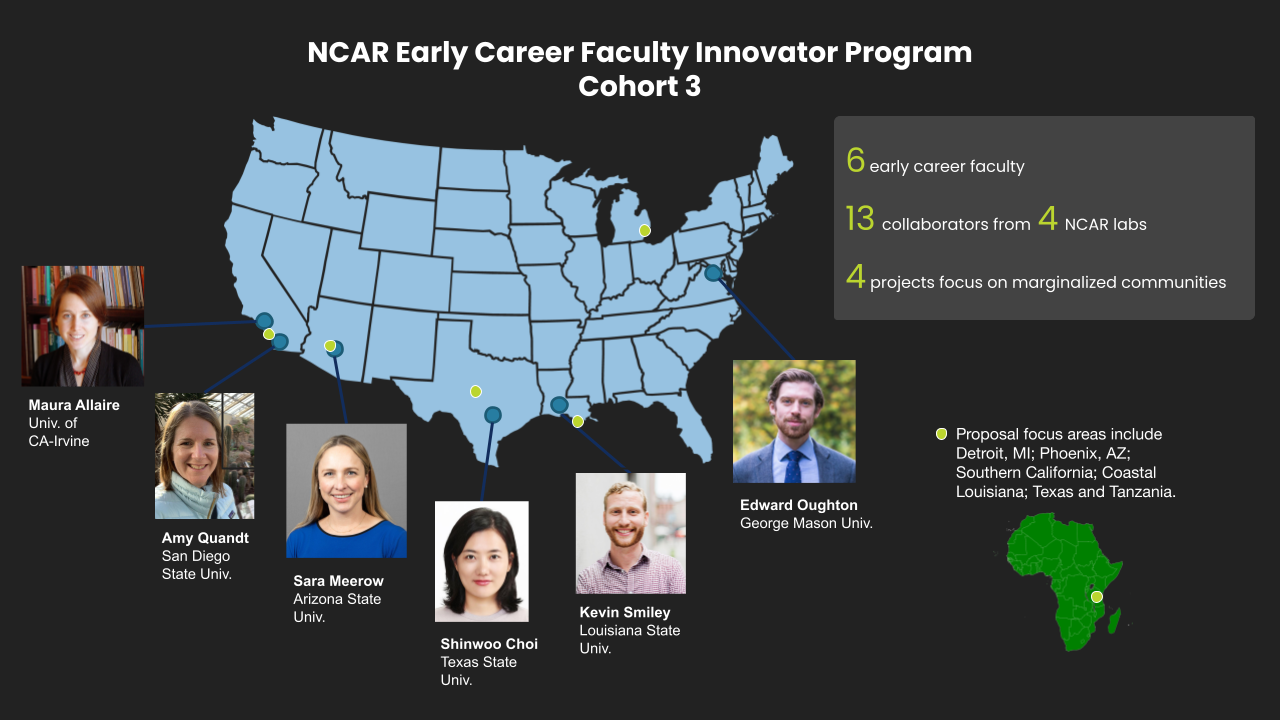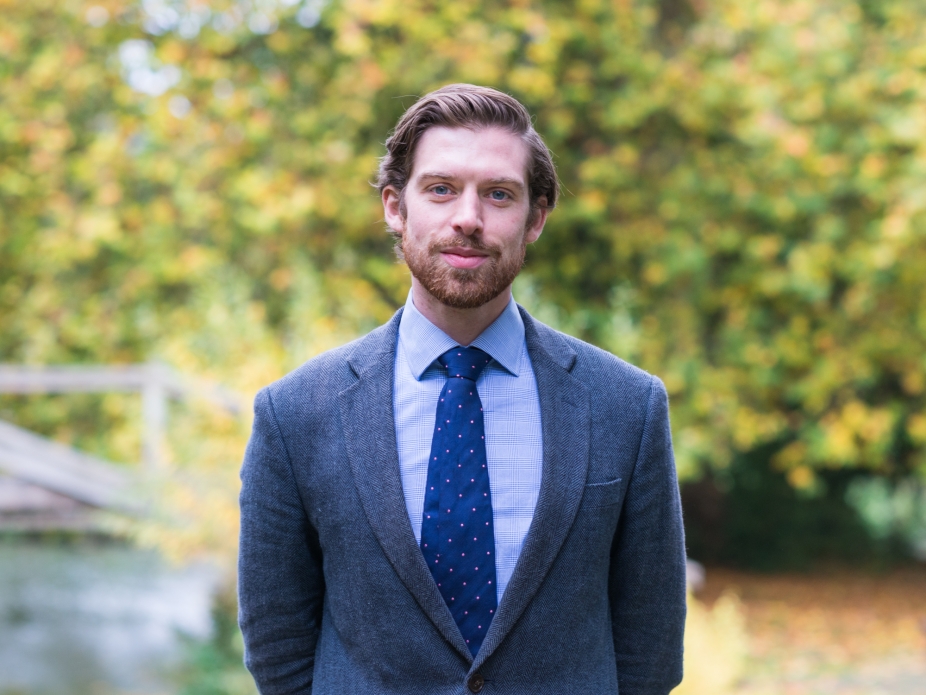2023-2025 Research Theme and Awardees
2023-2025 Awarded Proposals
Funded projects address a range of important topics, including adapting wastewater systems and optimizing the potential of green infrastructure to address climate risks, increasing our understanding of risk perception and decision-making behaviors in environmental justice communities, quantifying the socioeconomic impacts from space weather hazards, improving climate adaptation of arid and semi-arid regions through agroforestry, and advancing our understanding of climate-change attribution in the context of flooding.
Successful applicants proposed timely, societally relevant, and cutting-edge research plans that reflected a convergence research approach as evidenced by early project co-development with NCAR scientists. The selection process prioritized research that partnered with under-represented groups and built on broadening participation efforts of the NSF and NCAR’s strategic priorities.

|
MAURA ALLAIRE |
UNIVERSITY OF CALIFORNIA, IRVINE Advancing Equity in Wastewater Adaptation to Climate Change Aging systems, climate change, and disparities in wastewater infrastructure pose a harm to public health. Communities face growing risks due to sea level rise and extreme weather events, which can affect wastewater system function and contaminant flow to waterbodies. Onsite waste treatment systems (OWTS), such as septic systems, are an overlooked critical infrastructure that disproportionately serves marginalized communities, and are especially prone to failure. Despite wastewater system failures and growing future risks, little is known about the social dimensions of OWTS infrastructure or how climate change will affect OWTS. This study aims to advance capabilities for quantifying the distribution of benefits - both spatially and socially - due to adapting OWTS to climate change. Study objectives are to: (1) examine social impacts of inadequate OWTS infrastructure, under current and future climate conditions, (2) co-develop model to predict downstream impacts of OWTS failure due to climate change, and (3) identify barriers to wastewater system adaptation among households, operators, and regulators. These will be achieved using a combination of modeling and participatory stakeholder research. This effort builds off years of trust and relationship building with the Consortium for Alabama Rural Water and Wastewater and University of Alabama. Utilizing NCAR’s expertise in forecasting weather and floods at large scales, paired with Dr. Allaire’s expertise in household surveys, nonmarket valuation, and spatial econometrics, this project will examine social impacts of OWTS failure due to SLR and hydroclimatic events. Study results and the predictive model to be developed can guide more equitable investments in wastewater infrastructure and climate adaptation. Student Researchers: Flor Flores, Gabe Lara & Ricardo Rubio |
|
SHINWOO CHOI shinwoochoi@txstate.edu |
TEXAS STATE UNIVERSITY Climate Change, Infrastructure Disruption, and Extreme Weather Resilience: Cases of Environmental Justice (EJ) communities in Texas The proposed study explores the preparedness and responses to extreme weather hazards in Environmental Justice (EJ) communities in the state of Texas. Environmental Justice (EJ) communities refer to communities with more vulnerabilities, such as a higher unemployment rate than the national average and/or racial/ethnic minorities. Among the various extreme weather hazard cases that took place recently, the given study will target the severe winter storms which took place from February 13-17, 2021, commonly known as Uri and Viola. Together, they caused thousands of households in Texas to survive without water, electricity, and natural gas for several days due to infrastructure disruptions. The event is also worthwhile exploring as a case study since it is an example of compounding hazards. The given project will increase the understanding and effectiveness of risk perception and decision-making-related coping behaviors by individuals and communities, with a particular focus on rural vs. metropolitan EJ communities. Specifically, it will advance knowledge in the sectors of (1) measuring the impacts of extreme weather hazards-compounding disaster community’s well-being (psychological, physical, and socioeconomic), mainly via critical infrastructure disruptions (e.g., electricity and transportation), (2) association between a type of infrastructure disruption and social responses and well-being, (3) dynamics of impacts, responses, and needs over the process of disaster phase (spatiotemporal understanding), and (4) relationship and interplays between risk perception and decision making related coping behaviors, and the changes over time. Student Researchers: Hannah Bostic, Joshua Brenner & Sean O'Connor |
|
SARA MEEROW Sara.Meerow@asu.edu |
ARIZONA STATE UNIVERSITY Models for planning multifunctional and equitable green infrastructure to mitigate rising stormwater and heat risks in cities Communities across the U.S. are increasingly investing in green infrastructure (GI) to address growing climate risks and provide other social and environmental benefits. While vegetated GI, such as bioswales, rain gardens, and street trees, are widely promoted as a critical and multifunctional form of infrastructure, in practice GI is not strategically planned to maximize equity or multifunctionality. Decision-support tools could help community decision-makers target GI investments where multiple functions, such as mitigation of stormwater and heat, are most needed and where they have the greatest potential to improve human health and wellbeing. In collaboration with NCAR scientists and ASU students the project will build on Meerow’s existing Green Infrastructure Spatial Planning (GISP) modeling approach to make it more accurate, usable, and adaptable for diverse communities. This will be achieved through four specific objectives, including: evaluating the sensitivity of the GISP model to different hydrologic and heat-related measures; implementing and evaluating different weighting schemes; ensuring that the model is useful by surveying and interviewing local officials to understand their GI planning processes and decision-support needs; and creating an integrated, open-source version of the model that communities can easily use. This project will advance actionable earth science with and for society by co-developing decision-support tools that communities can use to more strategically and equitably plan GI to address two of the biggest climate-related challenges: stormwater management and extreme heat. The research will also advance our fundamental understanding of GI planning processes and spatial tradeoff and synergy patterns in GI functions. Student Researchers: Shaylynn Trego & Consolata Macharia Post-doctoral Researchers: Saeideh Sobhaninia |
|
EDWARD OUGHTON eoughton@gmu.edu |
GEORGE MASON UNIVERSITY Uncertainty Quantification of Space Weather Socio-Economic Impacts from Critical Infrastructure Failure Space weather phenomena have been studied in detail for centuries. However, rigorous assessment of the socio-economic impacts of this natural hazard is lacking in the literature compared to other threats. In recent years, the various socio-economic impact assessments carried out have all suffered from common issues. These include crude scientific representation of physical space weather hazards, highly simplified characterizations of failure in engineered infrastructure systems, and deterministic socio-economic estimates of scenario impacts. This research aims to build a new probabilistic decision support model for assessing space weather socio-economic impacts which overcomes these existing weaknesses, while capturing the inherent uncertainties associated with existing modeling approaches. The aim is to connect (1) HAO physics-based models of space weather hazards, (2) existing engineering-based critical infrastructure models, and (3) socio-economic assessment models based on econometric representations of the macroeconomy, to estimate the Gross Domestic Product (GDP) at risk from different sized space weather events. Full uncertainty quantification of these estimates will be undertaken. This proposal offers new policy evidence for the cost-benefit analysis of mitigation strategies for critical infrastructure. Moreover, it creates additional funding prospects for graduate students from underrepresented groups, new engagement opportunities with the DARA network (Development in Africa with Radio Astronomy), as well as providing transformative research opportunities for aspiring young computational social scientists. The research will also seek to build on past successes in media outreach, raising greater awareness across society of space weather. Student Researchers: Dennies Bor, Evan Alexander Peters & Matt Sprintson |
|
AMY QUANDT aquandt@sdsu.edu
|
SAN DIEGO STATE UNIVERSITY Climate change adaptation through agroforestry: an integrated socio-economic and biophysical assessment in two semi-arid regions Human activities are unequivocally affecting our earth’s climate system and increases in extreme weather and natural hazards have been documented across agroecosystems. Finding innovative, sustainable, and just strategies to adapt to our changing reality is critical to minimize the impact of climate change on lives and livelihoods. The agriculture sector in arid and semi-arid regions is particularly sensitive to the impacts of climate change, with devastating impacts on crop production and food security. Agroforestry, the integration of trees into an agricultural landscape, is one potential strategy utilized by farmers around the world to adapt to the impacts of climate change. While agroforestry can provide a multitude of economic, social and environmental benefits, it is not well understood how agroforestry can contribute to adapting agriculture to specific climate change-impacts across geographic contexts. This project thus addresses this important knowledge gap, brings together diverse knowledges through the collection of both social and biophysical data, and advances our theoretical understanding of climate change adaptation. The overarching goal of this project is to increase our understanding of how agroforestry can be an innovative tool for climate change adaptation in two different contexts: San Diego County, USA, and Hanang District, Tanzania. This will be accomplished in both study sites through (1) the modeling of current and future climate and assessing farmer climate information needs, (2) utilizing NCAR models and remote sensing products to assess the extent and biophysical benefits of agroforestry, (3) farmer surveys and interviews to assess social-economic benefits of agroforestry, and (4) bringing together diverse knowledges resulting in emergent forms of fundamental understanding. Student Researchers: Judy Bross |
|
KEVIN SMILEY ksmiley@lsu.edu |
LOUISIANA STATE UNIVERSITY Social Responses to Climate Change Attributed Flooding in South Louisiana Flooding is a major social issue, and climate change threatens to raise risks and impacts from extreme weather events. While research importantly identifies these risks in future climate change-fueled scenarios, less research examines how impacts may already be higher in our contemporary time. Although this work strongly showcases the contemporaneous impacts of climate change-attributed flooding, little work to date investigates if and to what extent spatial inequalities are found in climate change-attributed flooding. Further, we also have a limited sense of how individuals understand climate change attribution and flooding in the context of the risk profiles of their homes and communities. Combining these gaps, there is an imperative to advance a more holistic approach to understanding climate change attribution and flooding that identifies disparities as well as social interpretations of climate change attribution data in a way that catalyzes community-led social change to achieve more just social and environmental outcomes. To advance this holistic approach, this project uses a multidisciplinary, mixed methodological research framework to conduct climate change attribution analysis of Hurricane Ida in south Louisiana. This project will investigate socio-spatial inequalities found in climate change-attributed flood impacts from this hurricane. Further, to study social understandings of climate change attribution, Dr. Smiley will carry out primary data collection using in-depth interviews (i.e. qualitative analysis) and surveys (i.e. quantitative analysis) of local officials and residents of affected communities. NCAR researchers will generate climate change attribution estimates, shape effective downscaled hydrometeorological data, and iteratively identify how climate change attribution research can be strengthened with insights from the social science data. Student Researchers: Teye Yevuyibor, Heath McNeese & KayLynn Larrison |



